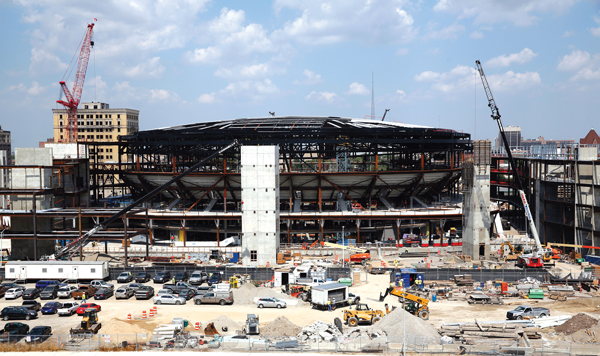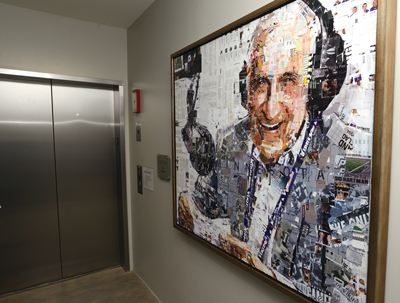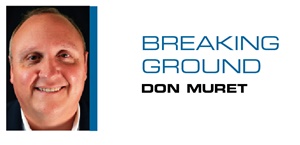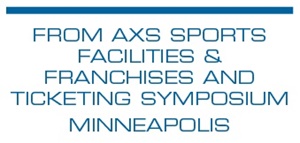The Detroit Red Wings have selected
Delaware North Sportservice to be their concessionaire at
Little Caesars Arena, sources said.
Team President Tom Wilson, who made a presentation at the conference on the arena project and the massive redevelopment of downtown Detroit, said
after the session that he was not ready to discuss a food provider for the arena, but did say he would be meeting with
Carlos Bernal, Sportservice’s chief operating officer. Bernal also attended the conference.
The $627 million arena will open in fall 2017. To this point, the Red Wings have operated food in-house at Joe Louis Arena, their home since late 1979.
The selection of Sportservice comes as no surprise to industry observers. The Buffalo firm has a strong relationship with the Ilitch family, owner of the Red Wings and the Tigers. Sportservice has run the food operation at Comerica Park since its second season of operation in 2001.
 |
The Red Wings’ Little Caesars Arena, taking shape in Detroit, would welcome the Pistons, says Red Wings President Tom Wilson.
Photo by: DAVID DUROCHIK
|
The Tigers are the vendor’s longest-running account, dating to 1930 at old Navin Field, which was later renamed Tiger Stadium.
Mike Ilitch bought the Tigers in 1992 from fellow pizza magnate
Tom Monaghan. Ilitch has owned the Red Wings since 1982.
> PISTONS/WINGS?: In addition, the Detroit Pistons are set to play some games at Little Caesars Arena starting in 2017, sources said, although the exact number is unclear.
Pistons owner Tom Gores has publicly discussed the possibility of moving downtown from the Palace of Auburn Hills, a single-concourse arena that opened in 1988 and has gone through extensive renovations over the past
 |
Photo by: GETTY IMAGES
|
28 years.
Wilson, without confirming the change, talked in general terms about what it would mean for the Pistons to join the Red Wings in their new digs.
“They have a beautiful building,” said Wilson, who was instrumental in spearheading the Palace development as president of Palace Sports & Entertainment before joining the Red Wings in 2010. “It’s an enormous asset that they would be walking away from. If you ever were going to do something like that, there are architectural changes [we] have to make for locker rooms, things like that. We have space in the building to accommodate another tenant. A team like the Pistons would be welcome down there with open arms, whether it’s 10 games, 20 games or 40 games. It would be amazing for the city.”
> FIERY FINISH: Len Komoroski, CEO of the Cleveland Cavaliers and Quicken Loans Arena, gave a vivid presentation on the Cavs’ exciting run to the NBA title, the city’s first sports championship since the Browns won the NFL title in 1964. As part of the video production, Komoroski set the tone for the city’s hard-luck history by playing the opening scenes of “Major League,” the 1989 movie in which the Cleveland Indians win a fictional World Series. As Randy Newman sang “Burn On,” the movie’s title tune, which references Cleveland’s Cuyahoga River catching fire multiple times, Komoroski took the crowd through forgettable times in city lore. The topper was vintage footage of former Cleveland Mayor Ralph Perk accidentally setting his hair on fire in 1972 while handling a welding torch at a ribbon-cutting ceremony for the American Society of Metals convention. Well done, Cavs.
> WOLVES’ TALE: Sports attorney Denis Braham’s visit to the Twin Cities reminded him of the time in 1994 that he represented a group of investors attempting to buy the Minnesota Timberwolves and relocate them to New Orleans. Top Rank of Louisiana, led by legendary boxing promoter Bob Arum, had a deal in place with team owners Harvey Ratner and Marv Wolfenson to purchase the club for $152.2 million. Multiple media outlets reported the sale was complete and The (New Orleans) Times-Picayune ran a giant Page 1 headline, “Got Em,” superimposed over a Timberwolves jersey. The reports, though, turned out to be premature. The NBA wanted the team to remain in Minnesota, five years after it had entered the league as an expansion team. At one point late in the negotiations, Braham met with then-NBA Commissioner David Stern and asked him, “David, what’s going on here? We have a deal to buy the team and move it to New Orleans.” Stern’s response: “We’re not in the deal-making business.” Top Rank filed suit against the NBA, but in the end, its bid failed. Ultimately, Minnesota businessman Glen Taylor bought the Timberwolves for $88.5 million and kept the team in the market.
> VEECK AS IN WRECK: Sports entrepreneur Mike Veeck entertained a post-lunch crowd with some one-liners during an on-stage interview with SportsBusiness Journal baseball writer Eric Fisher. Veeck and actor Bill Murray co-own the St. Paul Saints, an independent baseball team that opened a new ballpark in 2015. “Murray and I have had fistfights over design,” Veeck said. “He wins because he’s in better shape.” Veeck was among the masterminds behind “Disco Demolition,” the infamous promotion in the summer of 1979 in which an exploding crate of disco records damaged the outfield at old Comiskey Park and forced the Chicago White Sox to cancel the second game of a doubleheader against the Detroit Tigers. What drove the ill-fated promotion? “We were 20 games out in July,” said Veeck, who at the time served as marketing director for the team owned by his father, Bill Veeck. “I was a desperate man.”
> WHAT COULD HAVE BEEN: Sports construction executive Tom Tingle, inspired by Veeck’s comments about his life in baseball, called his wife, Patti, afterward and told her he was quitting his job at Skanska to buy a minor league team. Tingle was kidding, but about 20 years ago, it was no joke. In 1997, Tingle and his father, also named Tom, came close to purchasing a stake in a team proposed for Concord, N.H. Both planned to invest $25,000 before the elder Tingle opted for the opportunity to double his money through a work investment. The younger Tingle decided not to go through on the venture without his father, and the team never came to Concord. As an architect at the old HOK Sport in the 1990s, Tingle designed 15 to 20 minor league stadiums, including Class AAA venues AutoZone Park in Memphis; Chukchansi Park in Fresno, Calif.; and Durham Bulls Athletic Park in Durham, N.C. He still dreams about being a team owner.
 |
A collage portrait of Sid Hartman marks the press entrance at U.S. Bank Stadium.
Photo by: NANCY KUEHN / MINNEAPOLIS/ST. PAUL BUSINESS JOURNAL
|
> SEEN AND HEARD: During the team presidents panel, the Green Bay Packers’
Mark Murphy talked about his experience at
U.S. Bank Stadium, where the Pack lost to the Vikings in their regular-season opener. The stadium has 31 field-level suites, and Murphy pointed out that similar premium spaces would be a big hit at
Lambeau Field. “Can you imagine players doing the Lambeau leap over those suites?,” Murphy said. To this point, building field-level suites in Green Bay is not under consideration, Packers spokesman
Aaron Popkey said. …
Jeffrey Miller, senior vice president for MSA Security and the NFL’s former vice president of security, has been hired by the Los Angeles Rams to consult on their new $2.5 billion stadium in Inglewood. Miller’s firm has a leaguewide deal with the NFL to supply stadiums on game days with dogs trained to detect explosive devices. … Longtime Twin Cities sportswriter
Sid Hartman, who once owned a piece of the old Minneapolis Lakers, was spied at
Target Field working a Tigers-Twins game. Hartman, at age 96, still writes a column in the (Minneapolis) Star Tribune and co-hosts a Sunday morning radio show on WCCO-AM. To honor Hartman’s legacy, the Vikings named their press entrance after him at U.S. Bank Stadium. Historical photographs and a portrait of Hartman created from a collage of old newspaper clippings and media guides frame the Sid Hartman Media Entrance at the stadium’s southeast corner.
Don Muret can be reached at dmuret@sportsbusinessjournal.com. Follow him on Twitter @breakground.








